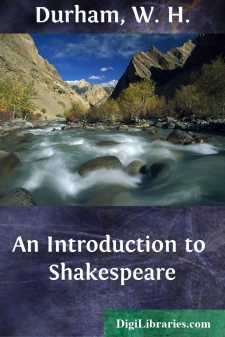Categories
- Antiques & Collectibles 13
- Architecture 36
- Art 48
- Bibles 22
- Biography & Autobiography 813
- Body, Mind & Spirit 142
- Business & Economics 28
- Children's Books 15
- Children's Fiction 12
- Computers 4
- Cooking 94
- Crafts & Hobbies 4
- Drama 346
- Education 46
- Family & Relationships 57
- Fiction 11828
- Games 19
- Gardening 17
- Health & Fitness 34
- History 1377
- House & Home 1
- Humor 147
- Juvenile Fiction 1873
- Juvenile Nonfiction 202
- Language Arts & Disciplines 88
- Law 16
- Literary Collections 686
- Literary Criticism 179
- Mathematics 13
- Medical 41
- Music 40
- Nature 179
- Non-Classifiable 1768
- Performing Arts 7
- Periodicals 1453
- Philosophy 64
- Photography 2
- Poetry 896
- Political Science 203
- Psychology 42
- Reference 154
- Religion 513
- Science 126
- Self-Help 84
- Social Science 81
- Sports & Recreation 34
- Study Aids 3
- Technology & Engineering 59
- Transportation 23
- Travel 463
- True Crime 29
An Introduction to Shakespeare
by: W. H. Durham
Description:
Excerpt
CHAPTER I
AN OUTLINE OF SHAKESPEARE'S LIFE
Our Knowledge of Shakespeare.—No one in Shakespeare's day seems to have been interested in learning about the private lives of the dramatists. The profession of play writing had scarcely begun to be distinguished from that of play acting, and the times were not wholly gone by when all actors had been classed in public estimation as vagabonds. While the London citizens were constant theatergoers, and immensely proud of their fine plays, they were content to learn of the writers of plays merely from town gossip, which passed from lip to lip and found no resting place in memoirs. There were other lives which made far more exciting reading. English sea-men were penetrating every ocean, and bringing back wonderful tales. English soldiers were aiding the Dutch nation towards freedom, and coming back full of stories of heroic deeds. At home great political, religious, and scientific movements engaged the attention of the more serious readers and thinkers. It is not strange, therefore, that the writers of plays, whose most exciting incidents were tavern brawls or imprisonment for rash satire of the government, found no biographer. After Shakespeare's death, moreover, the theater rapidly fell into disrepute, and many a good story of the playhouse fell under the ban of polite conversation, and was lost.
Under such conditions we cannot wonder that we know so little of Shakespeare, and that we must go to town records, cases at law, and book registers for our knowledge. Thanks to the diligence of modern scholars, however, we know much more of Shakespeare than of most of his fellow-actors and playwrights. The life of Christopher Marlowe, Shakespeare's great predecessor, is almost unknown; and of John Fletcher, Shakespeare's great contemporary and successor, it is not even known whether he was married, or when he began to write plays. Yet his father was Bishop of London, and in high favor with Queen Elizabeth. We ought rather to wonder at the good fortune which has preserved for us, however scanty in details or lacking in the authority of its traditions, a continuous record of the life of William Shakespeare from birth to death.
Stratford.—The notice of baptism on April 26, 1564, of William, son of John Shakespeare, appears in the church records of Stratford-on-Avon in Warwickshire. Stratford was then a market town of about fifteen hundred souls. Under Stratford Market Cross the farmers of northern Warwickshire and of the near-lying portions of Worcestershire, Gloucestershire, and Oxfordshire carried on a brisk trade with the thrifty townspeople. The citizens were accustomed to boast of their beautiful church by the river, and of the fine Guildhall, where sometimes plays were given by traveling companies. Many of their gable-roofed houses of timber, or timber and plaster, are still to be found on the pleasant old streets. The river Avon winds round the town in a broad reach under the many-arched bridge to the ancient church....


